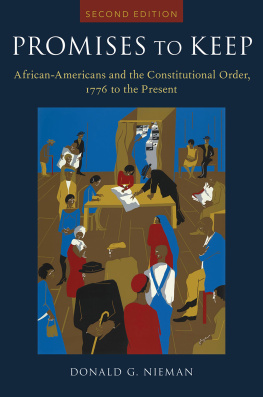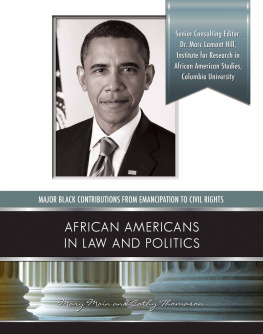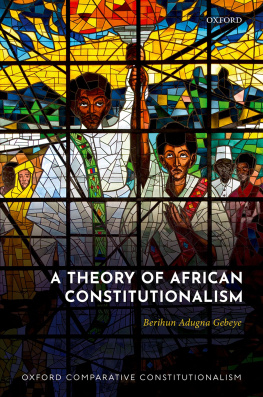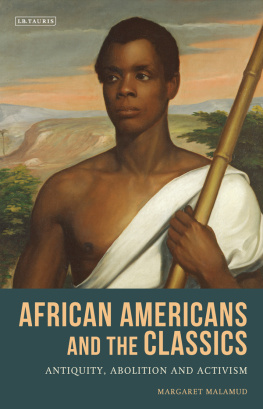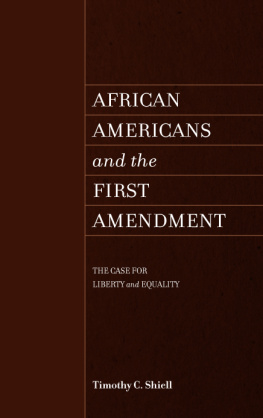Promises to Keep
Originally published in the series:
ORGANIZATION OF AMERICAN HISTORIANS BICENTENNIAL ESSAYS ON THE BILL OF RIGHTS
By General Editor
Kermit L. Hall
With Editorial Board
Michal R. Belknap
Harold M. Hyman
R. Kent Newmeyer
William M. Wiecek

Oxford University Press is a department of the University of Oxford. It furthers the Universitys objective of excellence in research, scholarship, and education by publishing worldwide. Oxford is a registered trade mark of Oxford University Press in the UK and certain other countries.
Published in the United States of America by Oxford University Press
198 Madison Avenue, New York, NY 10016, United States of America.
Oxford University Press 2020
All rights reserved. No part of this publication may be reproduced, stored in a retrieval system, or transmitted, in any form or by any means, without the prior permission in writing of Oxford University Press, or as expressly permitted by law, by license, or under terms agreed with the appropriate reproduction rights organization. Inquiries concerning reproduction outside the scope of the above should be sent to the Rights Department, Oxford University Press, at the address above.
You must not circulate this work in any other form and you must impose this same condition on any acquirer.
Library of Congress Cataloging-in-Publication Data
Names: Nieman, Donald G., author.
Title: Promises to keep : African Americans and the constitutional order,
1776 to the present / Donald G Nieman.
Description: Second edition. | New York, NY : Oxford University Press, [2020] |
Series: Organization of American Historians bicentennial essays on the Bill of Rights |
Includes bibliographical references and index.
Identifiers: LCCN 2019031629 (print) | LCCN 2019031630 (ebook) |
ISBN 9780190071639 (hardback) | ISBN 9780190071646 (paperback) |
ISBN 9780190071660 (epub) | ISBN 9780190071653 (updf) | ISBN 9780190071677 (online)
Subjects: LCSH: African AmericansCivil rights. |
Civil rights movementsUnited StatesHistory. | Civil rightsUnited
StatesHistory.
Classification: LCC E185.61 .N5 2020 (print) | LCC E185.61 (ebook) | DDC
323.1196/073dc23
LC record available at https://lccn.loc.gov/2019031629
LC ebook record available at https://lccn.loc.gov/2019031630
Cover image: Jacob Lawrence (American, 19172000). The 1920s... The Migrants Cast Their Ballots from Kent Bicentennial Portfolio: Spirit of Independence, 1974. Serigraph in seven colors plus white on Domestic Etching paper, edition 83 of 125 plus 10 artists proofs; 32 24 7/8 inches (81.28 63.18 cm). Collection Albright-Knox Art Gallery, Buffalo, New York; Gift of Lorillard Company, 1975 (1975:9.8).
For Leigh Ann & Brady
Who bring love, joy, and meaning to my life
Contents
I wrote Promises to Keep almost thirty years ago. Since then a lot has changed. The internet put a wealth of sources at my fingertips, making trips to the library far less frequent. When I needed the text of a statute, an obscure court case, a New York Times story from 1981, or polling data on public support for affirmative action in 1995, a Google or Lexis search quickly retrieved the information. Changes in politics and public policy have also been remarkable. The United States elected an African American president in 2008, something few would have predicted in 1991, when some Democrats doubted they would see a member of their party in the White House in their lifetimes. In 2015, the US Supreme Court ruled that the Fourteenth Amendment guaranteed same-sex couples the right to marry. And in 2016, Hillary Clinton became the first woman to win the presidential nomination of a major party and secured a 3 million vote popular majority, only to lose the electoral vote to a reality TV star who bragged about groping women.
While much has changed, some things have not. Raceespecially African American identity and experienceremains central to public discourse, political debates, and constitutional interpretation. Barrack Obamas election in 2008 and reelection in 2012 were historic events that showed how far Americans have come, but they did not herald a post-racial era. Segregation remains a reality; African Americans suffer disproportionately from poverty, are imprisoned in shockingly high numbers, and die at the hands of police far too frequently; Neo-Nazis march by torchlight; a successful presidential candidate used more openly racist language in 2016 than George Wallace did in his 1968 and 1972 campaigns; and states adopt voter ID laws that deny many persons of color the right to vote. Central to American politics, public policy, culture, everyday life, and law since the seventeenth century, raceand racismremain hotly debated as the nation enters the third decade of the twenty-first century.
History is central to this debate. Those who believe that institutionalized racism perpetuates racial hierarchy and that race-conscious remedies for itlegal, political, and economicremain necessary to achieve substantive equality take the long view. They point out that the vestiges of a racial caste system rooted in four centuries of slavery, segregation, and racist violence remain. These continue to burden African Americans even though whites only signs have disappeared, blacks vote at about the same rate as whites, racist language brings swift rebukes, and an African American has held the nations highest office. From this perspective, racism remains woven into of the fabric of American life and strong, purposeful action is necessary to reduce and ultimately remove it. Conservatives, on the other hand, focus on the recent past. They tout the undeniable progress achieved in the past half century. Drawing on the language of the early civil rights movement, whose target was de jure segregation, they often cite Martin Luther Kings dream that my four little children one day will live in a nation where they will not be judged by the color of their skin but by the content of their character. In their view, race-conscious policies, even when designed to remedy the effects of past discrimination, violate the values of the civil rights movement, the Civil Rights Act of 1964, and the Fourteenth Amendments equal protection clause and are unconstitutional.
Because race remains a hotly contested issue and history figures prominently in the debate, a second edition of Promises to Keep seemed in order. My goal was twofold. First, I wanted to incorporate some of the most important insights from scholarship published since 1991 into the original narrative and analysis. This has allowed me to read many truly fascinating books and articles, some written by a new generation of scholars, others by old friends who continue to contribute to our understanding of law and race in the United States. Not only has my reading been enjoyable, but it has also underscored how vibrant the fields of African American, legal, and civil rights history remain. My second objective was to analyze and make sense of developments of the past three decades and place them in the context of more than two centuries of African American engagement with the Constitution.
No one should be surprised that race and civil rights continue to occupy a prominent place in constitutional as well as political discourse. Since the nations founding, race has been a dominant force in American life and, therefore, central to its constitutional order. During the Revolutionary era, as they drafted new constitutions, Americans fiercely debated the place of slavery in a republican society that was founded on the self-evident truth that all men are created equal and are endowed by their Creator with certain unalienable rights, including the right to Life, Liberty, and the pursuit of Happiness. Debate over slavery not only figured prominently at the Constitutional Convention in 1787, but played a crucial role in the evolution of constitutional doctrine during the next six decades. Fundamental mattersthe scope of national power, the nature of the federal system, the definition of citizenship, the rights of US citizenswere shaped by the debate over slavery and racial subordination. Ultimately, slavery proved the nemesis of the Union, shattering the constitutional order and plunging the country into a bloody Civil War.

